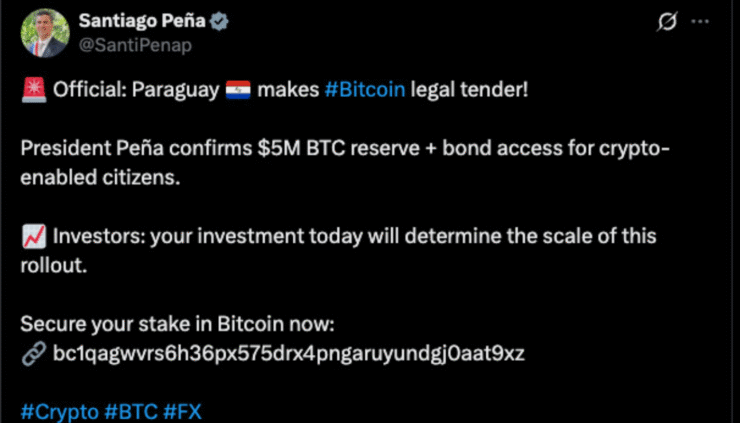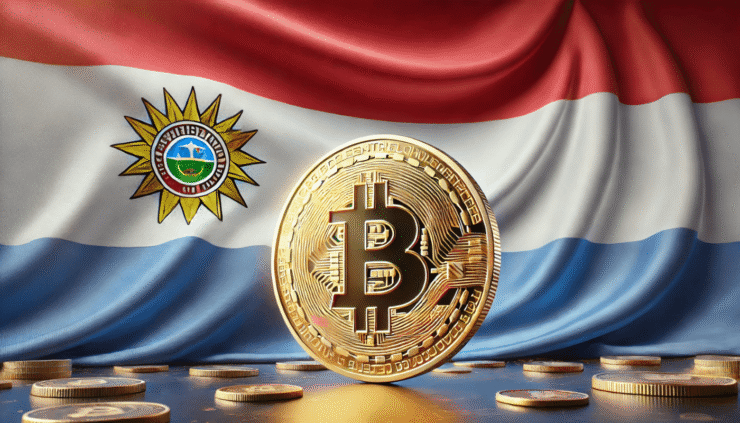In a swift turn of events on Monday, the Paraguayan government issued an urgent clarification after President Santiago Peña’s official X (formerly Twitter) account published a post declaring Bitcoin as legal tender in the country. The post, which also included claims about a $5 million BTC reserve fund and a wallet address for supposed investors, was quickly flagged as unauthorized.
Just minutes later, Paraguay’s presidential office released a statement warning the public to “dismiss any recently published content” that lacked formal confirmation. The administration did not directly name the Bitcoin post but made clear that the president’s account had likely been compromised.
The misleading tweet, written in English, caused brief confusion among crypto watchers and local media. It falsely stated that Paraguay was following in the footsteps of El Salvador, establishing Bitcoin as legal currency and inviting people to contribute to a government-backed reserve fund—complete with a crypto wallet address, raising red flags of a potential scam.
The announcement sparked speculation but was almost immediately walked back by the government’s digital communications team, who confirmed that no such policy decision had been made and that an investigation was underway into what they described as “irregular activity.”

Paraguay Confirms Hack, Warns Public to Trust Official Channels
As of the time of publication, the original post had been deleted from Peña’s personal account, while the government’s official statement warning citizens to disregard unconfirmed content remains live. Officials emphasized that only verified announcements released through sanctioned channels should be trusted. The presidency added that it is coordinating directly with X to resolve the issue and prevent further confusion.
The timing of the misleading post has fueled speculation about Latin America’s broader engagement with digital assets. Several countries in the region have reportedly explored frameworks similar to El Salvador’s Bitcoin strategy. El Salvador, under the leadership of President Nayib Bukele, made headlines in 2021 by officially recognizing Bitcoin as legal tender—a decision that has both inspired and divided global policymakers.
However, El Salvador’s policy has faced increasing scrutiny, especially following a financial agreement with the International Monetary Fund in late 2024 that cast doubt on how enforceable its crypto laws remain today.
Hackers Use X to Spread Misinformation and Influence Markets
Social media platform X (formerly Twitter) has long been a tool of choice for hackers looking to manipulate crypto markets, disrupt public trust, and exploit digital vulnerabilities—often through high-profile impersonations or account takeovers.
Before Elon Musk acquired the platform in 2022, X had already become fertile ground for crypto scams, with attackers routinely hijacking accounts belonging to politicians, celebrities, and institutions. One of the most notable cases came in 2021, when hackers seized control of Indian Prime Minister Narendra Modi’s verified account and falsely claimed that India had adopted Bitcoin as legal tender. The post caused temporary confusion among investors and news outlets.
More recently, the threat hit closer to home in the U.S. In early 2024, a hacker named Eric Council Jr. used a SIM swap attack to take over the Securities and Exchange Commission’s official X account. Once inside, Council posted a fake announcement that the SEC had approved spot Bitcoin ETFs—triggering temporary market movement. He was swiftly tracked, arrested, and later sentenced to 14 months in prison.
Quick Facts
- Paraguayan President Peña’s X account posted a false Bitcoin legal tender claim.
- Paraguay’s government disavowed the post, citing likely account compromise.
- A fake reserve fund with a crypto wallet raised scam concerns.
- Similar hacks have targeted public institutions, including India’s PM and the SEC.





